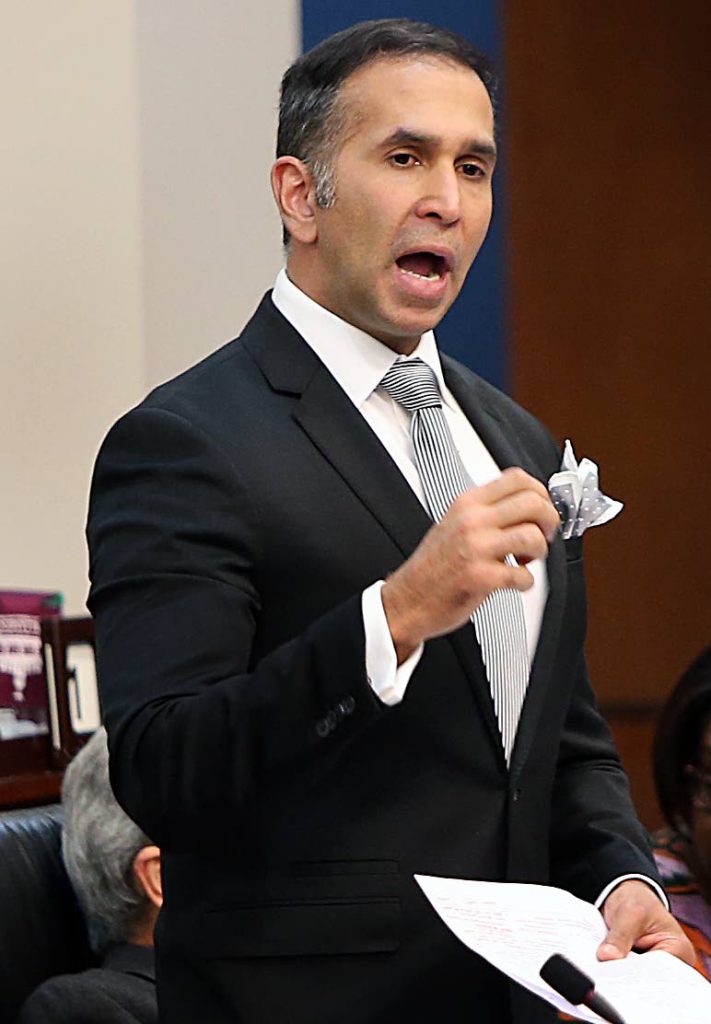AG makes argument for act to abolish Prelim Inquiries

Abolishing preliminary inquiries in the criminal justice system will be more humane and will reduce the number of years those charged will have to wait for trials says Attorney General Faris Al-Rawi.
Piloting the bill, “An Act to abolish preliminary inquiries and to provide for the pre-trial procedure in respect of indictable offences and for ancillary matters” in the Senate yesterday, Al-Rawi said the new law will give the Director of Public Prosecutions the responsibility to consider whether a charge should be dealt with indictably and proceed to the High Court, or if summarily and it should to a magistrate’s court.
Making the case to abolish preliminary inquiries, he said at present, a number of people have been incarcerated and are awaiting trial for several offences ranging from murder to sexual offences for periods of three to 14 years and over. This includes the Piarco Airport Inquiry.
The law dealing with preliminary inquiries and which is found in the substantive law, The Indictable Offences Preliminary Act, Chapter 12:01, he said, is 100 years and has been amended several times, the most recent being in 2014.
Noting that the number one issue is crime and criminality, which the country has been grappling with, he said, a number of laws have been introduced prior to the parliamentary recess to reduce the number of cases before the High Court and the magistracy.
They included laws to deal with the backlog of 100,000 traffic offences, persons being remanded to custody, introduction of an improved system by plea bargaining and trial by judge only in certain circumstances.
The last report, 2014 to 2015, of people passing through the magistrate’s courts, he said, was a total of 527,043. That included, he said, a whole array of offences including traffic, indictable, and civil offences which have to be dealt with by preliminary inquiry.
Arima accounted for 75,796 cases; Chaguanas, 41,809; Couva, 19,729; Mayaro, 10,872; Point Fortin, 17,173; Princes Town, 33,291; Rio Claro, 8,277; San Fernando (Old Court), 24,180; San Fernando (Medina Building) 24,667; Sangre Grande, 30964: Siparia, 29,951; St George West, 151,812; Tobago, 23,227; and Tunapuna, 34,293.
At present, the Judiciary consists of one Chief Justice, ten justices of appeal, 31 puisne judges and three masters. There are 50 magistrates in 12 magisterial districts.
In terms of criminal matters pending at the High Court as at July 31, 2015, he said, there was a total of 29,090 cases.
With the opening of the law term next week, he said, new figures could be expected.
Matters pending at the time in the High Court, he said, included murder, 417; attempted murder, 300; kidnapping, 439; arms and ammunition, 5,788; sexual offences, 3,597; narcotics 5,758; and fraud, 5,407.
When a crime is committed, he said, there is a judicial process, however, “You are taken into a process where the delay is so significant because of the design of the criminal justice system that justice will definitely be delayed.
Therefore, he said, there is no consequence to crime and criminality.

Comments
"AG makes argument for act to abolish Prelim Inquiries"